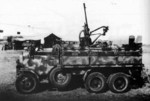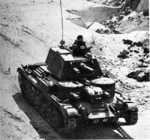Libya
| Alliance | Axis - Minor Member Nation or Possession | |
| Possessing Power | Italy | |
| Population in 1939 | 915,440 |
Contributor: C. Peter Chen
ww2dbaseItaly gained influence in North Africa from the Ottoman Empire after the Italo-Turkish War of 1911 to 1912. In 1934, Italy consolidated its three North African colonies of Tripolitania, Cyrenaica, and Fezzan into a single entity of Italian Libya. Civil liberties and the right to own property were granted to Libyan colonials at the same time, while Libyans were also allowed to join the Italian military, although Libyan units were always placed under the command of Italian officers. In the 1930s, Italy embarked on several major projects to improve infrastructure in Italian Libya, the most significant of which were transportation, which included the coastal road between Tripoli and Benghazi, various railroads (Tripoli-Zuara, Tripoli-Garian, Tripoli-Tagiura, Benghazi-Barce, and Benghazi-Soluch), the expansion of the ports at both Tripoli and Benghazi, and the establishment of a major airfield in Tripoli. Industries were also developed in the region, which were mostly food processing related plants, but also included a Fiat factory producing automobile parts and a number of agricultural machinery factories. By 1939, there were about 60,000 Italians living in Tripoli, making up 40% of the city's population; Italian records showed that there were 110,575 Italians living in Italian Libya in 1940, about 12% of the total population. On 9 Jan 1939, Royal Decree No. 70 was issued to make Italian Libya within the metropolitan territory of Italy, thus lifting the region's status from a mere colony to a part of the Italian Empire. In a seeming reversal from the violence between Italians and the colonials in the 1910s and 1920s, Italy courted the local Arab population. Along with lifting Italy Libya to near equal status as the provinces in Italy, the local population was now allowed to join the National Fascist Party, while several villages were established complete with mosques, schools, and hospitals to improve the standard of living. The term Fourth Shore (Quarta Sponda) was coined to reflect the area's importance within the Italian Empire.
ww2dbaseThrough the invasion of Egypt, Italian borders in North Africa expanded to the east. In early 1941, as British troops began pushing Italian troops back across the Egyptian-Libyan border, Germany dispatched Erwin Rommel and a force later known as the German Africa Corps to the region, pushing the Allies east and allowing Italian Libya's borders to expand to cover most of the Western Desert. On 17 Nov 1942, Italian Libya expanded into the French protectorate of Tunisia. In Feb 1943, Axis forces abandoned Libya and consolidated into Tunisia for the final defense of Axis holdings in North Africa, which ended in May of the same year, ending the Desert War. Tunisia was given to the Free French, the Western Desert had already been re-captured by British forces, and Libya was placed under British (former Tripolitania and Cyrenaica) and French (former Fezzan) control.
ww2dbaseAfter the war, Italy attempted to regain colonial influence in North Africa without success. In 1947, Italy signed the agreement to relinquish all claims to territory in North Africa. On 21 Nov 1949, the United Nations passed the resolution for Libya's full independence. On 24 Dec 1951, the United Kingdom of Libya was declared. Italians living in Libya gradually moved back to Italy in the 1950s and 1960s, and in 1970, on the orders of Muammar Gaddafi, all remaining 20,000 Italians in Libya were deported.
ww2dbaseSource: Wikipedia
Last Major Update: May 2011
| Events Taken Place in Libya | ||
| Operation Compass | 8 Dec 1940 - 9 Feb 1941 | |
| Battle of Kufra | 6 Jan 1941 - 1 Mar 1941 | |
| Operation Sonnenblume | 8 Feb 1941 - 6 May 1941 | |
| Battle of Giarabub | 21 Mar 1941 - 23 Mar 1941 | |
| Siege of Tobruk | 10 Apr 1941 - 27 Nov 1941 | |
| Bardia Raid | 19 Apr 1941 - 20 Apr 1941 | |
| Operation Brevity | 15 May 1941 - 16 May 1941 | |
| Operation Battleaxe | 15 Jun 1941 - 17 Jun 1941 | |
| Operation Crusader | 18 Nov 1941 - 14 Dec 1941 | |
| Battle of Cape Bon | 13 Dec 1941 | |
| Battle of Gazala | 26 May 1942 - 21 Jun 1942 | |
| Raids in Libya | 13 Sep 1942 - 19 Sep 1942 | |
Weather
WW2-Era Weather Data for Libya
Photographs
 |  |  |  |
Libya in World War II Interactive Map
Did you enjoy this article or find this article helpful? If so, please consider supporting us on Patreon. Even $1 per month will go a long way! Thank you. Share this article with your friends: Stay updated with WW2DB: |
Visitor Submitted Comments
15 Mar 2017 02:18:06 PM
Dear sir..my father was one of the Italian army while second war from my father was hostage arrested by British army for 4 years
Please check his name
Mr.Salem ajili BASHA AGHA
From yefren. Libya
Regards
21 Mar 2017 06:40:39 PM
Dear Sir,
I would like to know which archives in Libya or Italy hold information on which Italian regiments were based at which barracks in Tripoli and Benghazi in Libya from 1911- to 1943.
Thank you.
John
30 Aug 2017 08:16:35 PM
Dear Sir,
My father was working with British army during WWII as auto ambulance driver as well as his uncle Idris Abdsalam who join the third British army, I was wondering where can I get information about that.
Thank you
29 Oct 2017 10:04:50 AM
Dear Sir,
My father was a POW and held in camp 116 Benghazi before being shipped to Italy. Do you know whether this camp still exists and if it does, where can I find RECENT photos of it.
I thank you kindly.
16 Apr 2018 02:58:28 AM
Dear Sir .
My uncle joined the British army on 1949 since then no information about hem .
Please direct me to the wright web to get any information
3 Jun 2021 11:21:17 AM
My father was in LIBYA during wwII and was taken prisioner to Liverpool .Do have information on these camps?
All visitor submitted comments are opinions of those making the submissions and do not reflect views of WW2DB.
- » WW2DB's 20th Anniversary (29 Dec 2024)
- » Wreck of USS Edsall Found (14 Nov 2024)
- » Autumn 2024 Fundraiser (7 Nov 2024)
- » Nobel Peace Prize for the Atomic Bomb Survivors Organization (11 Oct 2024)
- » See all news
- » 1,150 biographies
- » 337 events
- » 44,024 timeline entries
- » 1,242 ships
- » 350 aircraft models
- » 207 vehicle models
- » 375 weapon models
- » 123 historical documents
- » 260 facilities
- » 470 book reviews
- » 28,587 photos
- » 432 maps
Lt. Gen. Lewis B. "Chesty" Puller, at Guadalcanal
Please consider supporting us on Patreon. Even $1 a month will go a long way. Thank you!
Or, please support us by purchasing some WW2DB merchandise at TeeSpring, Thank you!
9 Apr 2016 11:22:41 PM
Dear sir / Madam
I would like to ask if there is any recorders for the Libyans 2nd world war prisoner , as my grandfather was anticipated in the war and he was war prisoner in Egypt for almost 6 months .
I really appreciate your help and advice .
Regards
N.sefrita